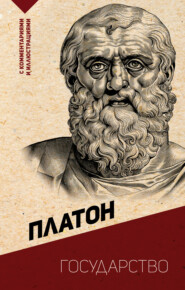По всем вопросам обращайтесь на: info@litportal.ru
(©) 2003-2025.
✖
The Republic
Настройки чтения
Размер шрифта
Высота строк
Поля
Yes, I have.
And shall potters be more careful in educating their children and in giving them the opportunity of seeing and practising their duties than our guardians will be?
The idea is ridiculous, he said.
There is also the effect on the parents, with whom, as with other animals, the presence of their young ones will be the greatest incentive to valour.
That is quite true, Socrates; and yet if they are defeated, which may often happen in war, how great the danger is! the children will be lost as well as their parents, and the State will never recover.
True, I said; but would you never allow them to run any risk?
I am far from saying that.
Well, but if they are ever to run a risk should they not do so on some occasion when, if they escape disaster, they will be the better for it?
Clearly.
Whether the future soldiers do or do not see war in the days of their youth is a very important matter, for the sake of which some risk may fairly be incurred.
Yes, very important.
This then must be our first step, – to make our children spectators of war; but we must also contrive that they shall be secured against danger; then all will be well.
True.
Their parents may be supposed not to be blind to the risks of war, but to know, as far as human foresight can, what expeditions are safe and what dangerous?
That may be assumed.
And they will take them on the safe expeditions and be cautious about the dangerous ones?
True.
And they will place them under the command of experienced veterans who will be their leaders and teachers?
Very properly.
Still, the dangers of war cannot be always foreseen; there is a good deal of chance about them?
True.
Then against such chances the children must be at once furnished with wings, in order that in the hour of need they may fly away and escape.
What do you mean? he said.
I mean that we must mount them on horses in their earliest youth, and when they have learnt to ride, take them on horseback to see war: the horses must not be spirited and warlike, but the most tractable and yet the swiftest that can be had. In this way they will get an excellent view of what is hereafter to be their own business; and if there is danger they have only to follow their elder leaders and escape.
I believe that you are right, he said.
Next, as to war; what are to be the relations of your soldiers to one another and to their enemies? I should be inclined to propose that the soldier who leaves his rank or throws away his arms, or is guilty of any other act of cowardice, should be degraded into the rank of a husbandman or artisan. What do you think?
By all means, I should say.
And he who allows himself to be taken prisoner may as well be made a present of to his enemies; he is their lawful prey, and let them do what they like with him.
Certainly.
But the hero who has distinguished himself, what shall be done to him? In the first place, he shall receive honour in the army from his youthful comrades; every one of them in succession shall crown him. What do you say?
I approve.
And what do you say to his receiving the right hand of fellowship?
To that too, I agree.
But you will hardly agree to my next proposal.
What is your proposal?
That he should kiss and be kissed by them.
Most certainly, and I should be disposed to go further, and say: Let no one whom he has a mind to kiss refuse to be kissed by him while the expedition lasts. So that if there be a lover in the army, whether his love be youth or maiden, he may be more eager to win the prize of valour.
Capital, I said. That the brave man is to have more wives than others has been already determined: and he is to have first choices in such matters more than others, in order that he may have as many children as possible?
Agreed.
Again, there is another manner in which, according to Homer, brave youths should be honoured; for he tells how Ajax, after he had distinguished himself in battle, was rewarded with long chines, which seems to be a compliment appropriate to a hero in the flower of his age, being not only a tribute of honour but also a very strengthening thing.
Most true, he said.
Then in this, I said, Homer shall be our teacher; and we too, at sacrifices and on the like occasions, will honour the brave according to the measure of their valour, whether men or women, with hymns and those other distinctions which we were mentioning; also with
'seats of precedence, and meats and full cups;'
and in honouring them, we shall be at the same time training them.
That, he replied, is excellent.
Yes, I said; and when a man dies gloriously in war shall we not say, in the first place, that he is of the golden race?
To be sure.
Nay, have we not the authority of Hesiod for affirming that when they are dead
'They are holy angels upon the earth, authors of good, averters of evil, the guardians of speech-gifted men'?
Yes; and we accept his authority.

















